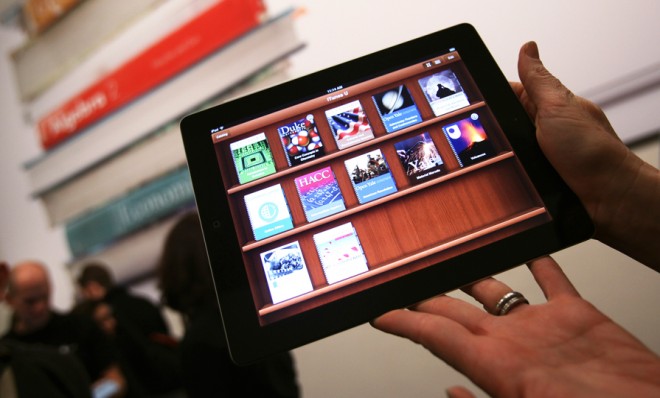Apple found guilty of price-fixing e-books: What now?
Chalk up another win for Amazon

A free daily email with the biggest news stories of the day – and the best features from TheWeek.com
You are now subscribed
Your newsletter sign-up was successful
On Wednesday, a U.S. judge in New York found Apple guilty of illegally conspiring with five major publishers to drive up e-book prices in concert with the launch of the iPad and Apple Book Store in 2010.
Judge Denise Cote wrote in her decision, "Apple played a central role in facilitating and executing that conspiracy."
But while "illegal" and "conspiracy" aren't words we normally like to associate with our favorite companies, the odd circumstances surrounding Apple's plan may make this one one of the most sympathetic price-rigging schemes in history.
The Week
Escape your echo chamber. Get the facts behind the news, plus analysis from multiple perspectives.

Sign up for The Week's Free Newsletters
From our morning news briefing to a weekly Good News Newsletter, get the best of The Week delivered directly to your inbox.
From our morning news briefing to a weekly Good News Newsletter, get the best of The Week delivered directly to your inbox.
The conspiracy in question went something like this:
In the years leading up to the iPad release, Amazon dominated the e-book market, offering titles for $9.99 a pop — a handsome discount from the $14.99-plus customers paid at book stores. Though Amazon didn't make a killing on the titles — in fact, it bought them at wholesale prices and sold often at a loss — the idea was to flood the market with Kindles. And it worked: Customers seemed to think the discounted books helped make up for the Kindle's $200 price tag.
When Apple was prepping its book store and iPad release, it allegedly set out to push up prices across the board — in a bid to prevent a virtual monopoly in the e-book market. As stacks of emails the Justice Department presented at the trial showed, Apple reached out to the five publishers and suggested they switch to an "agency model," where the publisher sets the e-book price, and Apple receives a 30 percent commission on each book sold. The publishers, whose bottom line was being hurt significantly by Amazon's price-depressing model, agreed, and prices for e-books rose sharply to $12.99 and $14.99 for best sellers and new releases.
When the Justice Department pressed charges in 2012, all the publishers — Macmillan, Penguin, Hachette, HarperCollins, and Simon & Schuster — folded like cheap tents, with some settling within in just days. But Apple called the charges "bizarre," insisting, "We're not going to sign something that says we did something we didn't do. And so we're going to fight."
A free daily email with the biggest news stories of the day – and the best features from TheWeek.com
In Apple's closing arguments on June 20, it reiterated its claim that it acted independently for legitimate legal purposes when it launched the agreements with the five publishers.
But the Justice Department's lawyer, Mark W. Ryan, insisted in his closing statement that, "Apple's agreements with the publishers created price caps for best sellers and new releases, but publishers quickly adopted those prices — $12.99 to $14.99—as the going rates for e-books," reported the Wall Street Journal.
"The ceilings became floors as they priced to the cap," said Ryan.
Judge Cote agreed.
Will the ruling dramatically affect the price of e-books? Probably not, since e-book prices began falling shortly after the suit was filed.
"Ebook prices dropped by a third literally overnight, as Amazon was free to lower its prices," Stanford law school professor Mark Lemley told AllThingsD. "So I wouldn’t expect to see a dramatic effect on consumer prices as a result of this ruling — we’ve already gotten the benefit of antitrust enforcement."
Apple will likely face another hearing, in which state attorneys general will try to recover damages on behalf of customers who had to pay more for e-books. But even if they're successful, Apple — which made $43.6 billion in revenue just last quarter — likely won't feel too much damage.
However, the ruling does set a precedent for content creators trying to make profits as their products go digital. Toward the start of the trial, Suzanne McGee of The Fiscal Times explained:
But if Apple loses, it may raise questions that go beyond e-books to other kinds of content, and the role that content providers can play in trying to collect what they see as a fair return on their investment. As content is delivered digitally, and streaming becomes the norm, the three-way tug of war among creators, vendors, and consumers over pricing is only going to become more complex and more heated. The verdict in this case, to paraphrase the words of Winston Churchill (himself a prolific author, whose history of World War II has often been priced at a discount for Kindle owners), won't mark the end, or even the beginning of the end, but perhaps just "the end of the beginning."
Carmel Lobello is the business editor at TheWeek.com. Previously, she was an editor at DeathandTaxesMag.com.